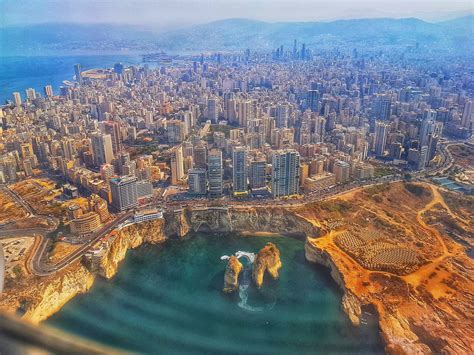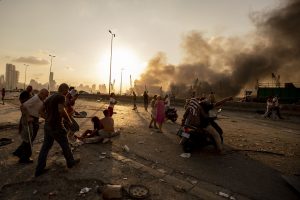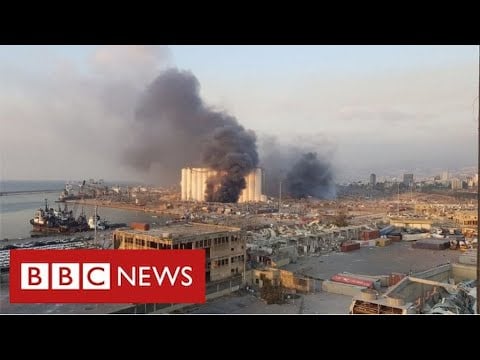
Civil war, entrenched sectarianism, widespread poverty, crippling food shortages, devalued currency, soaring debt, government-sponsored terrorism, unmitigated refugee crisis, bank insolvency, civil unrest; even the Greek god Atlas himself would strain to uphold the pillars that separate Lebanon from the potential hell that threatens to consume its populace and plunge them into a darkness they may never emerge from. A recent World Bank analysis reported by ABC News paints a grim picture: “Lebanon’s severe economic and financial crisis is likely to rank as one of the worst the world has seen in more than 150 years. The economic and financial crisis is likely to rank in the top 10, possibly top 3, most severe crises episodes globally since the mid-nineteenth century,”
For all intents and purposes, Lebanon is quickly becoming a failed state.

The Causes of Lebanon’s Problems
The causes of Lebanon’s demise are multifactorial, complex, and have long-standing historical roots. To begin with, Lebanon has been in political freefall. According to the Middle East Institute, “…the country was politically rudderless: there was no president between 2014 and 2016, there were multiple and lengthy delays in cabinet formation, and the 2018 parliamentary elections took place but only after a five-year delay.”

The current situation is not much better. Amid widespread social protest fueled by the desperate economic conditions, and exacerbated by the deadly port explosion in August of 2020, Prime Minister Hassan Diab stepped down as Lebanon’s official executive leader. However, Diab has stayed on in a temporary capacity as “caretaker prime minister” while Michael Aoun, Lebanon’s current president, works with prime minister-designate Saad Hariri to cobble together some form of cohesive governing body. So far, there has been no apparent progress.
An explosion in the port of Beirut on August 4, 2020 caused widespread damage, resulting in 7,500 injuries and 207 deaths.
Lebanon: A Study in Corruption
To make matters worse, widespread government corruption holds fruitful negotiations hostage. As Diab points out, “ . . .corruption cases are widespread in the country’s political and administrative landscape; other calamities hiding in many minds and warehouses, and which pose a great threat, are protected by the class that controls the fate of the country.” Sadly, the fate of the Lebanese people are held in the hands of political elites, each with their own agendas. The United Press International reports a dark portrait of the social landscape: “Only the wealthy few who smuggled their money abroad, or the lucky ones working for foreign companies and earning U.S. dollars, are able to maintain a decent living.”
Lebanon: A Puppet for Hezbollah
Yet, the reality is that Lebanon is essentially run by Hezbollah, an organization designated as a terrorist group by the United States, other Western countries, and several Latin American countries. Beyond its roles of governance and sponsorship of terrorism, Hezbollah itself is mired in the corruption that prevents Lebanon from moving forward.
The Foundation for the Defense of Democracies (FDD), frames it this way: “A direct consequence of Hezbollah’s political control is that Lebanon’s financial system is rife with corruption, money laundering, drug smuggling, and other illicit finance. As a result, many of Lebanon’s most important financial institutions are in the crosshairs of a lawsuit in the United States: Bartlett v. Société Générale de Banque au Liban S.A.L. (SGBL), et al. The complaint alleges that these banks provided financial services to Hezbollah and ‘facilitated the flow of U.S. dollar-denominated funds Hezbollah used to bankroll its operations in Iraq. These operations killed Americans.’”
Lebanon’s Banking System
Moreover, Lebanon’s political and social unrest have compounded the already shaky monetary and financial woes of Lebanon. The Middle East Institute describes it this way: “Banks, already insolvent, experienced a sharp liquidity crunch, forcing them to declare a ‘bank holiday’ and institute severe restrictions on bank withdrawals. A foreign exchange black market emerged and the national currency, the lira, sharply depreciated. In turn, inflation soared and people’s real wages and purchasing power collapsed.”
The confluence of these negative dynamics have had a profound and pervasive impact upon the economy of Lebanon. A Brookings Institute report states that due to “ a faltering confessional governance structure, unable to undertake reforms and unlock foreign assistance, sectarian and social tensions are rising as the economy spirals downward. GDP decreased 20.3 percent in 2020 and is projected to decline 9.5 percent in 2021.”

Yet, the shrinking GDP and devalued currency are merely the data points that underscore another foreboding catastrophe: the refugee crisis. As Habitat for Humanity points out, “ Lebanon has more than 1 million Syrians and over 400,000 long term refugees from Palestine now living among a national population of 4 million. The country now has the highest per capita concentration of refugees in the world.”
Additionally, a recent report by the United States Institute of Peace points to further refugee problems if Lebanon’s turmoil is not addressed: “State collapse in Lebanon could also provoke a new wave of displacement. Lebanon hosts the highest number of refugees per capita in the world, and refugees often are among the most threatened in such crises. At the same time, a growing number of impoverished Lebanese may also seek to escape the turmoil. Should the situation in Lebanon continue to deteriorate, Europe may once again find itself facing the challenge of new refugee flows.”
Seen through this lens, Lebanon is quickly becoming a global issue. And though there have been offers for financial aid via the International Monetary Fund, the chaotic and sectarian nature of the Lebanese government effectively prevents monies from reaching the beleaguered citizens. This has resulted in a form of endemic debilitation which prevents any significant international help. Again, the Middle East Institute sheds some light on the etiology of this socio-political disease, emphasizing this “…paralysis reflects an active decision by the political class to do nothing: high inflation, exchange rate depreciation, and deposit ‘lirafication’ shift the burden onto the population at large and away from the interests of the oligarchy.”
The bottom line is that Lebanon’s problems have been around for quite a while, and any efforts to attenuate the current state of affairs will take not only highly-coordinated international efforts but a reimagining of the very existence and fabric of Lebanon, from top to bottom. As economist James Rickards stated to the FDD, “An overhaul of the system is needed. Anything less risks transferring billions to a global terrorist organization and perpetuating one of the largest Ponzi schemes in history.”
Meanwhile, the world community holds its collective breath as Atlas strains to prevent a humanitarian crisis of epic proportions from unfolding in real-time.
Your opinion matters. Please share your thoughts in our survey so that Newsweed can better serve you.
Are you a budding poet? Enter our poetry contest for bragging rights and an opportunity to win some cash!




